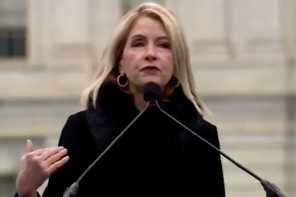I don’t really buy this whole battleground thing—us vs. them, science vs. religion, evolution vs. creationism. Maybe it makes for good press and sells some books—The God Delusion, The Republican War on Science, Thank God for Evolution, etc.—to people who already agree with the authors anyway. But does it get us anywhere?
And what of Stephen Jay Gould’s “non-overlapping magisteria,” the idea that science and religion each have their own separate domains and questions, that they should both do their thing and leave each other alone? Nope. Sorry, that doesn’t work either. Gould is right in one way: both science and religion do come down to the big questions of what makes us human, who we are and where we come from. But of course we’re both our biology and our religion, tightly woven together; the two strands as interactive and codependent as nature and nurture or the double helix. All this talk of “wars” and “battlegrounds” amounts to nothing more than banging our heads against the trees and ducking behind them to avoid each other’s arrows, while blinding ourselves to the forest itself.
Why does this matter? Because this is one important forest we’re missing. Many of the issues dividing this country—homosexuality, global warming, abortion, stem cells—weave ethics and religion and science. If we make it a war, instead of a conversation, we’ve got a problem. We have a problem.
For those trying to figure out where I’m coming from I’ll save you the leg work: I’m a biochemist, geneticist, and scientist educator who is Jewish and believes in God.
So what makes us who we are?
Here’s a shot or two from biology: we are our environment and its interactions with our biology, our DNA and our brains. Our environment is the air we breathe, what we eat and drink and smoke, and the experiences we have. We are also the environment of our ancestors—ancient and recent. There’s the well-known DNA-gene blueprint handed down over millions of years, a kind of historical record of adaptations to the environments of our past relatives. The environment changes the expression of the blueprint, determining which genes are turned on and when. I eat a candy bar and genes are turned on to help digest that candy bar, and then they’re turned off. I yell at my 5-year-old to keep him from falling into the canyon and my stress response and its relevant genes are turned on, and then off. I remember that incident because it was especially emotional, and that memory is somehow stored in molecules in my brain. It becomes part of me, affecting what I do or don’t do, think or don’t think. We are our experiences reflected off our biology reflected back to our experiences.
Now, get this: we actually can also pass our experiences on to the next generation. This is new stuff called epigenetics, because epi means “above,” and it’s another layer of information storage and passing on, above, and marked on, but not changing the genes—only whether they’re expressed. Mouse babies whose moms don’t give them much paws-on care grow up to be much more anxious, stress-prone adults than mouse babies who get a lot of care. This is true whether the babies are adopted or not. And the girl babies when they grow up provide the same type of care to their babies that their moms did for them.
Half of a studied group of (human) moms who were pregnant and present at Ground Zero on 9/11 suffer post-traumatic stress disorder. Many of the babies they gave birth to also have the biologic marks of the disorder. Some children of Holocaust survivors also may have biologic marks of their parents’ experiences. In one study, whether people died of diabetes-related illness correlates strongly to how much their grandparents had to eat at key biologic stages in their lives. We are our experiences, and some of them we even pass on, both orally and biologically.
Evolutionary biologists (famous ones, even, like E.O. Wilson) build a pretty good argument that human beings have evolved to be spiritual. To simplify, the idea goes something like this: we have evolved to respond to that noise in the woods because it could be a tiger; we turn to look, and there’s no tiger; but we need to have an explanation for things we can’t explain, so we come up with (often a supernatural) one. Or maybe God made—or evolved us—in the first place to want to seek out answers or to want to understand God and life or, maybe, all of the above.
Regardless, here we are—an integrated helix of nature and nurture, mind and brain, experience and biology—needing to move forward in the world. Richard Dawkins (in The God Delusion and elsewhere) says we give matters spiritual and religious unfairly privileged space, that whenever Religion is attached to an idea, we back up and don’t treat it critically. But the fact remains that, in this country anyway, spiritual matters—prayer, social gatherings at places of worship, reading holy texts, studying your faith, etc.—are some of the richest and most meaningful experiences we have. Ninety percent of Americans are associated with a religious congregation; 70% pray at least once a week. These are a vital part of who people are. Sure, let’s not allow spiritual concepts to go unchallenged, but of course such concepts hold a special place and respect. We are our experiences reflected off our biology reflected back to our experiences.
This is not a call to hold hands around the campfire and sing Kumbaya. This is a call for scientists, educators, and the media to engage science in its rich ethical and even spiritual context and for spiritual and political leaders to integrate relevant science into their public discourse. This is not a call to bring God into the science classroom, but for scientists not to exclude and ignore what is clearly one of the most vital experiences and contexts in America. The stakes are high.




